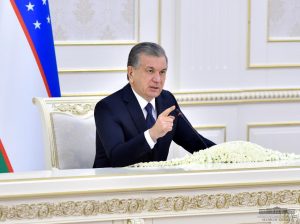On April 1, Uzbek media reported that the government was sending humanitarian aid to neighboring Afghanistan to help prevent the spread of the novel coronavirus disease, COVID-19. A train laden with aid, including medical masks, personal protective equipment, thermal imagers, as well as flour, oil, rice, soap, and clothes was dispatched from Angren to pass through Tashkent, Termez, and planned to arrive in Mazar-e-Sharif.
At a time of such serious crisis across the world, in many ways normal international politics has stopped. Bilateral visits and multinational forums have been postponed and cancelled. What avenues for diplomacy remain are narrowly focused as governments the world over concentrate on their own domestic situations during the COVID-19 pandemic.
But diplomacy, like life, finds a way.
In the details of what efforts are being made we can see familiar patterns outlining interests and aims; the strategic use of goodwill points the way to what partners countries value and, more importantly, those with which each country can find ways to cooperate with at a difficult time.
China has been in the harsh spotlight for deploying aid strategically; Beijing’s aid to select European countries has been criticized sharply in the West as a “virus PR offensive.” But the strategic deployment of aid need not always be seen in such a cynical light.
Uzbekistan’s Shavkat Mirziyoyev is a perfect example of strategically employed communication and cooperation (and this is not a negative). As RFE/RL’s Bruce Pannier wrote yesterday, “If there is one person responsible for actively trying to coordinate efforts within Central Asia, it is Uzbek President Shavkat Mirziyoev.”
Cooperation — starting with the direct neighborhood — has been a core feature of Mirziyoyev’s presidency and by far the most successful aspect of his reform program. Involving Afghanistan as a part of the Central Asian region is another.
As Pannier outlined, Mirziyoyev has made heavy use of his telephone to contact and coordinate with Uzbekistan’s neighbors: Kazakh President Kassym-Jomart Tokayev and Turkmen President Gubanguly Berdimuhamedov on March 18; Kazakh First President Nursultan Nazarbayev on March 20; Afghan President Ashraf Ghani on March 26; Berdimuhamedov again on March 27 and Kyrgyz President Sooronbay Jeenbekov also on March 27.
Tokayev has made his share of calls too — two with Jeenbekov on March 19 and 27; Russian President Vladimir Putin on March 20; Chinese President Xi Jinping on March 24; and UN Secretary General António Guterres on March 24. Both Mirziyoyev and Tokayev have touched base with their direct neighbors. Uzbekistan’s central position puts it at the core of regional coordination — its own security depends on it.
Central Asia began confirming COVID-19 cases in mid-March, starting with Kazakhstan on March 13, Uzbekistan on March 15, and Kyrgyzstan on March 18. Tajikistan and Turkmenistan remain global outliers, not reporting any cases to date.
In the above outline of Uzbek telephone diplomacy, Turkmenistan’s double appearance and Tajikistan’s complete absence are curious. Pannier discussed the conspicuous silence between Tajik President Emomali Rahmon and the neighborhood:
The one leader in Central Asia with whom Mirziyoev has not spoken since the outbreak of coronavirus in the region is Tajik President Emomali Rahmon.
In fact, there is no record of any Central Asian leader speaking with Rahmon until March 28, when Kyrgyzstan’s Jeenbekov called him.
Given the great effort Mirziyoyev has put in over the past four years to repair the atrophied relationship between Uzbekistan and Tajikistan, it’s intriguing that Rahmon hasn’t been rung up yet. Undoubtedly, there are lower levels of communication that are likely being employed. The lack of a top-level call may be a sign — but of what? Pannier suggest it could be “evidence of Tashkent’s displeasure with his [Rahmon’s] seemingly cavalier attitude toward imposing measures to control the possible spread in Tajikistan.” It could also be evidence of recalcitrance on the Tajik side — if Dushanbe won’t take the call, Tashkent won’t make it.
Turkmenistan’s two calls are also interesting as Ashgabat is blithely humming along in a state of denial too, vastly underplaying the risk of the coronavirus and denying any cases in the country. Allegedly some plainclothes police have taken people off the street for discussing the pandemic. According to the Uzbek side, the virus was a topic of discussion in those calls; on the Turkmen side, the readout is much more vague.
To close, let’s return to that aid headed for Afghanistan. By far, Afghanistan is the country in the wider Central Asian region least prepared and least able to handle a full-blown pandemic. The reasons are myriad: 19 years of war is not conducive to much, let alone a strong economy or building a strong public healthcare system; extreme political turmoil is not helpful in handling a crisis; and the delicate peace process with the Taliban demands attention, too. Meanwhile, it costs Uzbekistan very little to provide aid, which will mean much to Afghanistan.
And Uzbekistan hasn’t just sent aid to Afghanistan. Kyrgyzstan recently received flour, protective overalls, gloves and thousands of respirators, among other goods, from Uzbekistan.
Samandar Hikmatullayev, a press officer of the Ministry of Emergency Situations of the Republic of Uzbekistan, is quoted in the press release announcing the aid to Afghanistan saying, “Today there is no country in the world that would be indifferent to the fate of other countries… the coronavirus infection has put the entire world’s population at risk. It can be defeated only by the joint efforts of all countries. The assistance provided by Uzbekistan to the Afghan people is a clear example of this cohesion.”
As of April 2, Uzbekistan has registered 190 cases of COVID-19 and two deaths; Kazakhstan has logged 423 cases and three deaths; Kyrgyzstan has recorded 116 cases and no deaths to date and Afghanistan has marked 239 cases and four deaths.

































